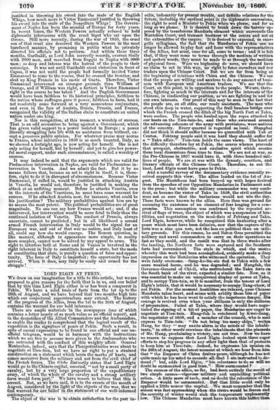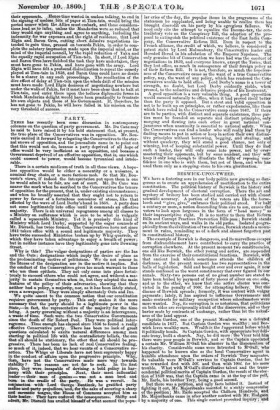LORD ELGIN AT ?MITS.
Ws draw on our imagination for a title to this article, but we are prepared Ia give reasons for the faith that is in us, and our belief that by this time Lord Elgin either is'or has been a conqueror in Pekin. We have a solid basis of facts from the 1st up to the 26th of August, and we have beyond that two months high into which our conjectural superstructure may extend. The history of the progress of the Allies, from the 1st to the 26th of August, contains the warrant for our bold inference.
There are ample materials in the newspapers (one of which contains a letter nearly of as much value as an official report), and in the despatches of th4llied Commanders and the Ambassadors, to enable the reader to coffitrebend that the logical 'result of the expedition is the signature Of peace at Pekin. Such 'a result, in spite of casual expressions to be found in one official and one un- official telegram, would be in harmony with the instructions which we are free to assume were given to the Ambassadors who are entrusted with the conduct of this weighty- affair. General Montauban, indeed, says that the Plenipotentiaries were about to negotiate at Tien-tsin, but we have no right to put a strained construction on a statement which bears the marks of haste, and comes moreover from the military and not from the civil chief 'of the Frenoh forces. The Globe distinctly states that Lord Elgin would go to the Chinese capital, escorted, ' not by a small party of cavalry, but by a vary large proportion of the expeditionary army, of which'the whole of the cavalry and a strong artillery force would form part." We have reason to believe that this is correct. But, as we have said, it is in the events of the month of August, considered by the light of the objects of the war, that we find warrant for our belief in the statement of our well-informed contemporary. The object of the war is to obtain satisfaction for the past in-
sults, indemnity for present trouble, and definite relations for the future including the cardinal point in the diplomatic concessions, the right to send a Minister to Pekin when we please, and for as long as we please. It is desired to break down the barrier op- posed by the treacherous Mandarin element which surrounds the Mantehou Court, and transact business at the centre and not at
the extremities of the empire. It is desired to expound, in ener- getic syllogisms, the fact that the Mandarins of Pekin can no
longer be allowed to play fast and loose with the representatives of the Allies, but must, once for all, come to terms ; and it is felt that, if they wont come to terms through the medium of written and spoken words, they must be made to so through the medium of physical force. Were we heginning de novo, we should have no claim to act in 'this way, no right to force ourselves and our traders upon the Chinese Court. But we are far from being at the beginning of relations with China and the Chinese. We see that the people are willing and anxious to do any amount of busi- ness with European and American traders. We see' that the Court, on this point, is in opposition to"the people. Wettre, there- fore, fighting as much in the interests and for the interests of the Chinese, in vindicating our position, as we are fighting in and for
our own interests. One proof of this may be seen in the fact that the people tire, on all sides, our ready assistants. The men' ho
stood chin deep in water, supporting the frail bamboo bridge over which the Frenoh crossed the ditch of the big North Fort at Taku, were coolies. The people who hauled upon the ropes attached to our boats on the Tien-tsin-ho, and those who swarmed around the advancing columns of the army with provisions, were natives of the country. Every quarrel is regarded as local. 'Shanghai did not think it should suffer because we quarrelled with Yeh at Canton, Pehtang people said it was hard they should suffer for a " Taku affair." Tien-tsin holds the same views. The knot of the difficulty therefore lay at Pekin, the source whence proceeds that arrogant, obstructive, and exclusive spirit which creates these local dissensions from time to time. We are not at war, as the Pro-Chinese in 1857 would have it, with three hundred mil- lions of people. We are at war with the dynasty, courtiers, and literary officials of the Chinese Court. Therefore, to out the knot, Lord Elgin must have gone to Pekin.
And a' careful survey of the documentary evidence recently re-
ceived supports this view. The allies landed on the let of Au- gust. The Mantehous had been buoyed up with hopes derived
from the speeches of our Opposition Mandarins in Parliament and in the press ; but while the military commander was very confi- dent, as became the victor of Taku in 1858, the civil authorities were not so sure that the barbarians would not win the day. These facts were known to the allies. Here then was ground for assuming the existence of an element of fear longing for a com- promise. This assumption was confirmed by the repeated ar- rival of flags of truce, the object of which was a suspension of hos- tilities, and negotiation on the mud-flats of Pehtang and Taku. Lord Elgin, however, while he recognized this hankering after a peace which must have been delusive, saw that the capture of the forts was a 'sine qua non, not the less on political than on mili- tary grounds. For this reason, he and Baron Gros permitted the military and naval commanders to carry on their operations as fast as they could, and the result was that in three weeks after the landing, the Northern forts were captured and the Southern forts had surrendered. The style in which, and the means whereby this work had been accomplished, evidently made a deep impression on the Mandarins who witnessed the operation. They were fairly overcome. Sang-ko-lin-sin fled to Pekin with a few score wearied horse, and he was degraded:; and Hangfuh, the Governor-General of. Chi-li, who surrendered the Taku forts on the South bank of the river, expected .a similar fate. Now, as it was essential to make an unequivocal display of power at Taku, and to occupy Tien-tsin, so it is manifest, from the tenour of Lord Elgin's letters, that it would be necessary to occupy Tang-chow, if not Pekin. For the moment hostilities are relaxed, your Chinese Mandarin takes heart, and seizes with avidity those bits of paper with which he has been wont to satisfy the impetuous fauqui. His courage is revived even when your stillness is only the stillness of preparation. Foiled at Taku, where they would have nego- tiated the signing of a bit of paper, the Mandarins are eager to negotiate at Tientsin. Sang-fuh is reinforced by Kwei,diang, the negotiator of 1858, and a member of the council, who is sent express to Tien-tsin. " Do not bring too many ships," writes Hang, for they " may excite alarm in the minds of the inhabi- tants," in other words convince the °inhabitants that the placards of Mr. Hang, proclaiming a victoty,.are not true. Now we have no reason to suppose that Lord Elgin looked upon these eager efforts to stop his progress in any other light than that of pretexts to keep him at Tien-tsin. Indeed, he expresses his opinion on the 26th of August, the latest moment at which we hear from him that " the Emperor of China desires peace, although he has not quite made up his mind to concede all that I am instructed to de- mand ;" but, adds Lord Elgin, " his reluctance to do so will no doubt be surmounted in good time." How surmounted ?
The success of the allies, so far, had been entirely the result of two simple causes—vigorous military and unyielding political action. A little more of each, and no doubt the reluctance of the Emperor would be surmounted. But that little could only be applied a little nearer the capital. We must remember that the season was fast approaching when the rivers would be frozen and the severity of winter would sink the temperature unpleasantly low. The Chinese Mandarins must have known this better than
their opponents. Heneetime wasted in useless talking, to end in the signing of useless bits of paper at Tien-tsin, would bring the period nearer when the Allies must embark, and these considera- tions lead us to infer, unless thR Mandarins were so reduced that they would sign anything and agree to anything, including the indemnity for war expenses and the right of residence, that Lord Elgin and Baron Gros, cutting. :Short delusive negotiations in- tended to gain time, pressed ontowards Pekin, in order to com- plete the salutary impression made upon the imperial mind, or the mind of the imperial council, by the rapid reduction of Taku and the equally rapid occupation of Tien-tsin. In short, if Lord Elgin and Baron Gros have finished the task they have undertaken, they must have gone to Pekin, and have gone with the army. Lord Elgin will have felt a profound disinclination to repeat the comedy played at Tien-tsin is 1858, and Baron Gros could have no desire to be a sharer in any such proceedings. The recollection of the dire effect of delay at Tien-tsin upon the whole drift of the mission must have made. Lord Elgin desirous of negotiating nowhere but under the walls of Pekin, for it must have been clear that to halt at Tien-tsin, and enter there upon the tedious diplomatic forms in which Mandarins delight would have been practically to frustrate his own objects and those of his Government. If, therefore, he has not gone to Pekin, he will have failed in his mission on the very threshold of success.



























 Previous page
Previous page